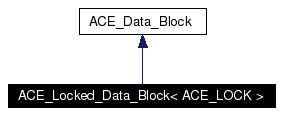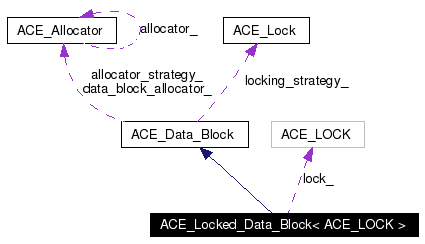
#include <Message_Block_T.h>
Inheritance diagram for ACE_Locked_Data_Block< ACE_LOCK >:


Public Member Functions | |
| ACE_Locked_Data_Block (void) | |
| Default "do-nothing" constructor. | |
| ACE_Locked_Data_Block (size_t size, ACE_Message_Block::ACE_Message_Type msg_type, const char *msg_data, ACE_Allocator *allocator_strategy, ACE_Message_Block::Message_Flags flags, ACE_Allocator *data_block_allocator) | |
| Initialize. | |
| virtual | ~ACE_Locked_Data_Block (void) |
| Delete all the resources held in the message. | |
| virtual ACE_Data_Block * | clone_nocopy (ACE_Message_Block::Message_Flags mask=0, size_t max_size=0) const |
Private Member Functions | |
| ACE_Locked_Data_Block< ACE_LOCK > & | operator= (const ACE_Locked_Data_Block< ACE_LOCK > &) |
| ACE_Locked_Data_Block (const ACE_Locked_Data_Block< ACE_LOCK > &) | |
Private Attributes | |
| ACE_LOCK | lock_ |
| The lock. | |
Data_Blocks can be parametric on the kind of lock they use; in many cases the lifetime of the lock is tied to the lifetime of the Data_Block itself. But since Data_Blocks are reference counted it is hard for users to control the lock lifetime. This class is parametric over the kind of lock used.
Definition at line 38 of file Message_Block_T.h.
|
||||||||||
|
Default "do-nothing" constructor.
Definition at line 8 of file Message_Block_T.inl.
00009 {
00010 this->locking_strategy_ = &this->lock_;
00011 }
|
|
||||||||||||||||||||||||||||||||
|
Initialize.
Definition at line 15 of file Message_Block_T.inl. References ACE_Message_Block::ACE_Message_Type, and ACE_Message_Block::Message_Flags.
00021 : ACE_Data_Block (size, 00022 msg_type, 00023 msg_data, 00024 allocator_strategy, 00025 &lock_, 00026 flags, 00027 data_block_allocator) 00028 { 00029 } |
|
||||||||||
|
Delete all the resources held in the message.
Definition at line 17 of file Message_Block_T.cpp.
00018 {
00019 }
|
|
||||||||||
|
|
|
||||||||||||||||
|
Return an exact "deep copy" of the message, the dynamic type is ACE_Locked_Data_Block<> See the documentation in Message_Block.h for details. Reimplemented from ACE_Data_Block. Definition at line 22 of file Message_Block_T.cpp. References ACE_NEW_MALLOC_RETURN, ACE_TRACE, ACE_Data_Block::allocator_strategy(), ACE_Data_Block::clr_flags(), ACE_Data_Block::data_block_allocator(), ACE_Data_Block::flags(), ACE_Message_Block::Message_Flags, ACE_Data_Block::msg_type(), and ACE_Data_Block::size().
00024 {
00025 ACE_TRACE ("ACE_Locked_Data_Block::clone_nocopy");
00026
00027 // You always want to clear this one to prevent memory leaks but you
00028 // might add some others later.
00029 const ACE_Message_Block::Message_Flags always_clear =
00030 ACE_Message_Block::DONT_DELETE;
00031
00032 ACE_Locked_Data_Block<ACE_LOCK> *nb = 0;
00033
00034 ACE_NEW_MALLOC_RETURN (nb,
00035 static_cast<ACE_Locked_Data_Block<ACE_LOCK>*> (
00036 this->data_block_allocator ()->malloc (sizeof (ACE_Locked_Data_Block<ACE_LOCK>))),
00037 ACE_Locked_Data_Block<ACE_LOCK> (
00038 max_size == 0 ?
00039 this->size () : max_size,
00040 this->msg_type (),
00041 0,
00042 this->allocator_strategy (),
00043 this->flags (),
00044 this->data_block_allocator ()),
00045 0);
00046
00047 // Set new flags minus the mask...
00048 nb->clr_flags (mask | always_clear);
00049 return nb;
00050 }
|
|
||||||||||
|
|
|
|||||
|
The lock.
Definition at line 66 of file Message_Block_T.h. |
 1.3.6
1.3.6